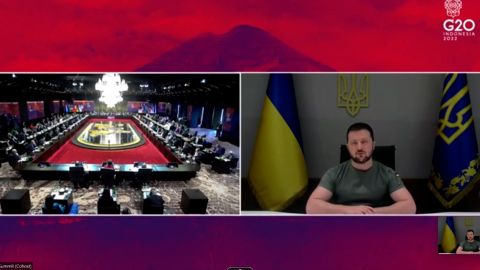G20, APEC, ASEAN: World leaders conclude three summits in Asia — with Russia
Bangkok, Thailand
CNN
—
The three major summits of world leaders that took place across Asia in the past week have made one thing clear: Vladimir Putin is now sidelined on the world stage.
Putin, whose attack on Ukraine over the past nine months has devastated the European country and roiled the global economy, declined to attend any of the diplomatic gatherings – and instead found himself subject to significant censure as international opposition to his war appeared to harden.
A meeting of the Asia-Pacific Economic Cooperation (APEC) leaders in Bangkok closed on Saturday with a declaration that references nations’ stances expressed in other forums, including in a UN resolution deploring “in the strongest terms” Russian aggression against Ukraine, while noting differing views.
It echoes verbatim a declaration from the Group of 20 (G20) leaders summit in Bali earlier this week.
“Most members strongly condemned the war in Ukraine and stressed it is causing immense human suffering and exacerbating existing fragilities in the global economy,” the document said, adding that there were differing “assessments” on the situation within the group.
Discussions within the summits aside, the week has also shown Putin – who it is believed launched his invasion in a bid to restore Russia’s supposed former glory – as increasingly isolated, with the Russian leader hunkered down in Moscow and unwilling even to face counterparts at major global meetings.
A fear of potential political maneuvers against him should he leave the capital, an obsession with personal security and a desire to avoid scenes of confrontation at the summits – especially as Russia faces heavy losses in the battlefield – were all likely calculations that went into Putin’s assessment, according to Alexander Gabuev, a senior fellow at the Carnegie Endowment for International Peace.
Meanwhile, he may not want to turn unwanted attention on the handful of nations that have remained friendly to Russia, for example India and China, whose leaders Putin saw in a regional summit in Uzbekistan in September.
“He doesn’t want to be this toxic guy,” Gabuev said.
But even among countries who have not taken a hardline against Russia, there are signs of lost patience, if not with Russia itself, than against the knock-on effects of its aggression. Strained energy, issues of food security and spiraling global inflation are now squeezing economies the world over.
Indonesia, which hosted the G20, has not explicitly condemned Russia for the invasion, but its President Joko Widodo told world leaders on Tuesday “we must end the war.”
India, which has been a key purchaser of Russia energy even as the West shunned Russian fuel in recent months, also reiterated its call to “find a way to return to the path of ceasefire” at the G20. The summit’s final declaration includes a sentence saying, “Today’s era must not be of war” – language that echoes what Modi told Putin in September, when they met on the sidelines of the summit in Uzbekistan.
It’s less clear if China, whose strategic partnership with Russia is bolstered by a close rapport between leader Xi Jinping and Putin, has come to any shift in stance. Beijing has long refused to condemn the invasion, or even refer to it as such. It’s instead decried Western sanctions and amplified Kremlin talking points blaming the US and NATO for the conflict, although this rhetoric has appeared to be somewhat dialed back on its state-controlled domestic media in recent months.

In sidelines meetings with Western leaders this past week, however, Xi reiterated China’s call for a ceasefire through dialogue, and, according to readouts from his interlocutors, agreed to oppose the use of nuclear weapons in Ukraine – but those remarks are not included in China’s account of the talks.
China’s Foreign Minister Wang Yi later told Chinese state media that Xi had reiterated China’s position in his bilateral meeting with US President Joe Biden on the sidelines of the G20 that “nuclear weapons cannot be used and a nuclear war cannot be fought.”
But observers of China’s foreign policy say its desire to maintain strong ties with Russia likely remains unshaken.
“While these statements are an indirect criticism of Vladimir Putin, I don’t think they are aimed at distancing China from Russia,” said Brian Hart, a fellow with the China Power Project at the Center for Strategic and International Studies in Washington. “Xi is saying these things to an audience that wants to hear them.”
Russian isolation, however, appears even…
Read More: G20, APEC, ASEAN: World leaders conclude three summits in Asia — with Russia

